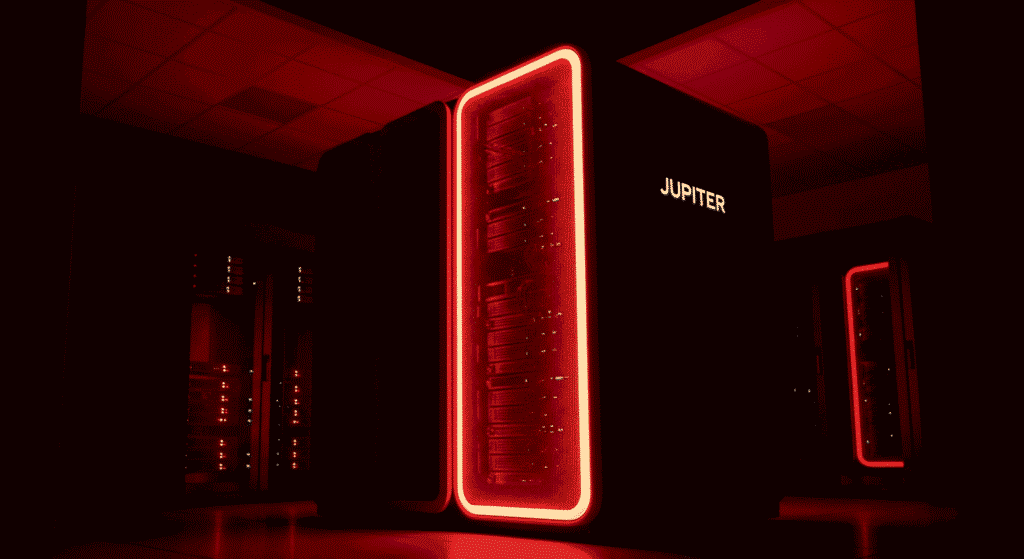Revolutionary 7 Jupiter Supercomputer Germany Breakthroughs That Will Transform Scientific Research in 2025
When you searched for ‘Jupiter supercomputer Germany’ at midnight, you weren’t just curious about another tech announcement—you sensed something massive was happening. Meet Sarah, a climate researcher who just witnessed how Europe’s first exascale supercomputer is rewriting the rules of scientific discovery in 2025.
The Bottom Line: What September 2025 Data Reveals About Jupiter Supercomputer Germany
Jupiter officially launched on September 5, 2025, at Forschungszentrum Jülich, attended by German Chancellor Friedrich Merz. This powerhouse ranks 4th on the June 2025 TOP500 list and stands as the most energy-efficient system among the top 5 supercomputers globally.
The Avoidance Path: When European researchers relied on outdated computing infrastructure, they watched helplessly as breakthrough discoveries took decades instead of months. With the global exascale computing market growing at 25.3% CAGR and expected to reach $48.6 billion by 2034, those who ignore this computational revolution risk being left behind.
How Jupiter Supercomputer Germany Actually Impacts Your World in 2025
Jupiter isn’t just another computer—it’s a paradigm shift. Based on Eviden’s BullSequana XH3000 liquid-cooled architecture, Jupiter runs 1 quintillion FP64 operations per second and delivers up to 90 exaflops of AI performance. The system features 24,000 Nvidia GH200 Superchips designed specifically for AI applications including large language model training and creating digital twins for healthcare and climate research.
For you, this means faster drug discoveries, more accurate weather predictions, and revolutionary AI breakthroughs that will reshape industries from healthcare to autonomous vehicles.
Your 7-Step Action Plan: Understanding Jupiter Supercomputer Germany’s Impact
- Jupiter Supercomputer Germany Foundation: This exascale computer will be key to drug discovery, climate forecasting, and quantum research applications
- Exascale Computing Implementation: The global exascale computing market was valued at $3.69 billion in 2023 and projects 27.8% CAGR growth through 2030
- AI Performance Optimization: Jupiter connects 24,000 GPUs mounted in 125 racks with 36,000 high-performance network cables, using 17MW at full capacity
- Climate Research Acceleration: Advanced weather modeling and climate predictions with unprecedented accuracy
- Healthcare Digital Twins: Personalized medicine through complex biological system simulations
- Quantum Simulation Mastery: Breakthrough quantum computing research capabilities
- European AI Competitiveness: Jupiter positions Europe to compete in the global AI race alongside US and Chinese supercomputing initiatives

Frequently Asked Questions About Jupiter Supercomputer Germany
What makes Jupiter supercomputer Germany different from other supercomputers?
Jupiter becomes the fastest supercomputer in Europe and ranks 4th globally while being the most energy-efficient system in the top 5. Its liquid-cooled architecture and 24,000 specialized AI chips deliver unprecedented performance for scientific research applications.
Sarah’s Two-Path Discovery: The 7 Critical Decisions
The Advantage Path: When Sarah’s climate research team gained access to Jupiter supercomputer Germany capabilities…
- Exascale Computing Power: Exascale systems perform at least a quintillion calculations per second, propelling supercomputing into new performance realms
- AI Research Acceleration: The AI supercomputer market is predicted to reach $6.43 billion by 2030, with Jupiter leading European innovation
- Energy Efficiency Leadership: Jupiter’s liquid-cooling technology delivers maximum performance while minimizing environmental impact
How does Jupiter supercomputer Germany compare to global competitors?
Jupiter ranks among the world’s top supercomputers while maintaining superior energy efficiency. The global supercomputer market grew from $10.13 billion in 2024 to $11.09 billion in 2025, expected to reach $27.5 billion by 2035, with Jupiter securing Europe’s competitive position.
What research applications will benefit from Jupiter supercomputer Germany?
Jupiter excels in climate modeling, neuroscience simulations, quantum computing research, and AI model training. The exascale computing market witnesses rapid expansion due to growing high-performance computing demands across AI, healthcare, and defense industries.
The Verdict: Why Jupiter Supercomputer Germany Matters More in 2025
Sarah’s climate research team can now predict weather patterns with accuracy that seemed impossible just months ago. Jupiter supercomputer Germany represents Europe’s bold step into the exascale era—where scientific breakthroughs happen in weeks, not years.
The choice is yours: embrace the computational revolution that’s reshaping scientific discovery, or watch as others leverage Jupiter’s unprecedented power to solve humanity’s greatest challenges first.
Essential Resource: For deeper insights into Jupiter’s technical specifications, check out Forschungszentrum Jülich’s official Jupiter documentation
To read more news about technology click here




